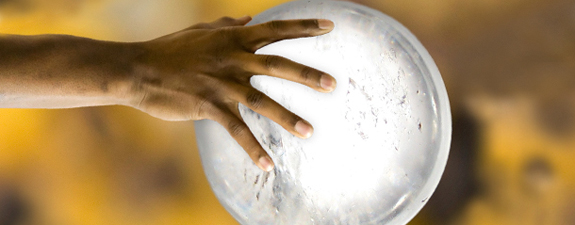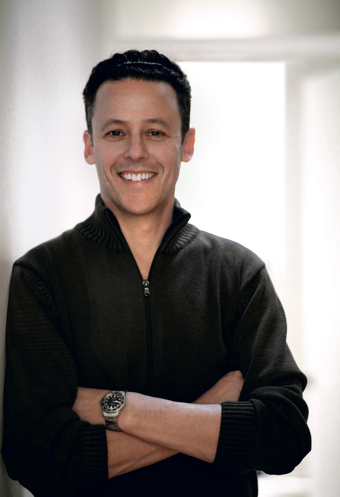Fast Company introduces a new series of interviews, in which we ask CEOs and others to don the futurist's wizard hat and gaze into our crystal ball. Our first interview, on the future of music, is with Drew Larner, the CEO of Rdio.

News is, rightly, about What Just Happened. But the modern business landscape shifts so rapidly that we need to know not just where we are, and where we've been, but also where we're headed. Today, we inaugurate a new series of interviews with CEOs, thinkers, and strategists about the road ahead. We're calling it Crystal Ballin'.
People in business are typically skittish about "forward-looking statements," a phrase that often has to be accompanied by a disclaimer. This series, then, is about coaxing major players in various businesses to get out of their comfort zone, to venture to speculate, to try on the futurist's hat for a spell.
Our first crystal baller is Drew Larner, CEO of Rdio, the social music subscription service from the founders of Skype and Kazaa, who talked to us about the future of the music industry. What follows is an edited transcript of our interview. To keep things from getting too crazy too quickly, we started off with a question about the past.
What has been the biggest innovation in the history of the music industry?
(Laughs.) I'm working towards being better about being comfortable about grand sweeping statements. This is a negative, but what's most impacted the music business is digital distribution and piracy. If you look at where the business is now, what impacted it to the greatest extent was that digital distribution happened the way it did as opposed to a licensing model early on. That cliche about the the horse being out of the barn, and so on. The founders of my company were involved in a company that had something to do with that, so there's certainly an irony there, in terms of where they were in 1999, 2000, 2001 with Kazaa.
How do you think we will listen to music one year from now?
 Look, I'd like to say everyone will be using Rdio. But I do think, a year from now, the number of people using subscription services will increase. Do I think physical is gonna go away in a year? No. People still buy CDs. I don't expect that tipping point to happen in a year.
Look, I'd like to say everyone will be using Rdio. But I do think, a year from now, the number of people using subscription services will increase. Do I think physical is gonna go away in a year? No. People still buy CDs. I don't expect that tipping point to happen in a year.
How about 10 years from now?
My hope and my belief is that subscription music by that point will be dominant, as it moves from where we are now to various devices. We see tons of Sonos users now. We'll see users on Xbox, PlayStation, TVs, Blu-Ray players, in the car--there will be a ubiquity of access points. People will move from one device to the next, unthinkingly. I hope we can get there in 10 years, if not sooner.
And how will we listen to music 100 years from now?
Oh God. I just finished this book, A Visit from the Goon Squad, by Jennifer Egan, and the last chapter takes place, I think, about 15 or 20 years from now. There's this little handheld device, and even little kids use it. They call the kids "pointers," and when kids like something they just point at it. There's this concert where little kids listen to music, and they do this pointing thing, and that's how music gets popular. That I found very interesting. It's an innate, almost animalistic thing for kids, the way kids' brains are working at the age of five. Kids use technology so easily. From day one, they're doing it. My kid is two and a half, but he knows how to use the iPad, which scares the hell out of me.
So you forecast a sort of digital generational divide, in terms of the way we'll experience music?
I think there's already a divide now.
Are we seeing a paradigm shift in the ways people relate to music?
We're reaching a tipping point where people are starting to realize, as they've done with movies and TV, that access versus ownership is a better way of consuming music. For a certain reasonable fee per month, you have access to every song you could want, available on any device. My background is more on the film and TV side, and I remember how back in law school--and this was a while ago--we were musing about how video stores were gonna go out of business, rentals were going to disappear. We said, "Oh, it's gonna happen in five years." But it didn't happen that fast. Then finally, it started to happen, when Hulu really exploded the ability to watch professional content whenever you want.
One of the most interesting suggestions I've heard lately is that the future of music will be determined by the app makers, sooner than the musicians themselves. Tell me about the thinking behind Rdio's recent decision to open its API to programmers.
The idea is what it does in terms of virality. Skype spread like wildfire, since it was easy to pass on and use, and you didn't have to pay. The API allows people to build simple apps like a Name That Tune app, for instance, or other interesting ways to experience music that we at Rdio might not even think of or have time to do. Virality in a paid product is challenging, obviously. Opening the API is a way to combat that.
So the idea is that opening the API leads to inventive apps, and those in turn serve as a kind of calling card for Rdio's subscription service?
A calling card's a great way of putting it, yes. It allows people to check out Rdio and see what we're about, and once they're engaged in the service, they'll find the experience is so good that they want to subscribe.
We recently wrote about an iPad app, Planetary, which visualizes your library as a solar system. Do you feel that we need better metaphors for a universe of digital music that's increasingly huge?
Ultimately what we have now is 8 million, 9 million tracks. It's daunting. It can be overwhelming. The way we built our service is with social discovery. People have always defined themselves by music. The way that used to be represented was by racks of music in homes. "This is my music. This is who I am." We wanted to maintain that ability to express ourselves through music. On Rdio, I can go look at a friends' collection, click on it. So for my collection, lately, I've been listening to a lot of Bob Marley, Allman Brothers, and lot of kids music that I've been playing for my kids. Someone can follow me or not: They can say, "I like his taste in music" or maybe "I think he has shit taste." It's a way to slice and dice a vast catalogue of music.
Should musical artists fear the future?
I think they should be excited about it. People's love of music is eternal, and it will continue. I think as artists continue to embrace where the business is going, it can ultimately prove only to be a benefit for them. I think, as a number of artists are doing, by weaving together their lives and merchandise and fan appreciation, this will ultimately prove to be positive for all going forward.
Follow Fast Company on Twitter. Email David Zax, the author of this post, or follow him on Twitter.